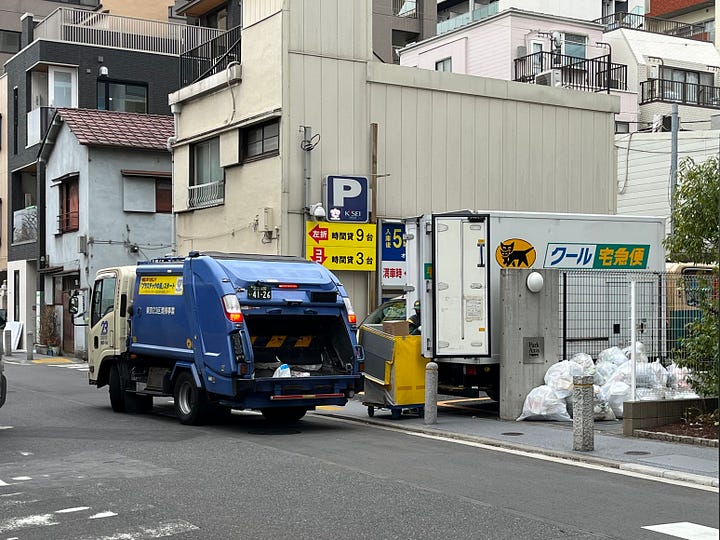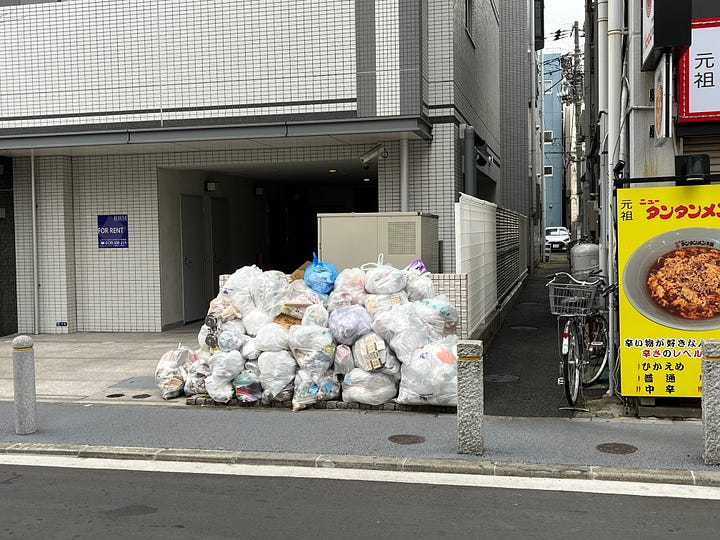It’s Friday in California and as I was making coffee I heard the garbage truck drive by on the other side of the street. Crap, garbage day! I hastily pulled the kitchen bags from under the sink and whisked them outside, along with the bit of recycling we’ve accumulated in just a few days of being here. I rolled everything to the curb in the big bins and thanked my lucky stars that the garbage truck always goes by on the other side before it turns and comes back to our side. It has saved my bacon more times than I can count.
This probably sounds like a normal and relatable routine if you live in the suburban US. But taking the trash out once a week isn’t necessarily how trash collection works around the world. As we’ve traveled, we’ve had to adjust to a variety of garbage disposal routines.
Also, we’ve discovered that Hefty garbage bags with strong ties at the top are not globally exported, LOL. I laugh because we haven’t actually bought Hefty bags in ages (Costco bulk size FTW), but just about every time I’ve had to tie up garbage bags as we travel, I chant “Hefty, Hefty, Hefty; wimpy, wimpy, wimpy” and hope that the garbage bags will stay intact. They are decidedly not hefty and often I’ve resorted to double bagging just to be sure they won’t spring a leak, especially if they get snagged on something on the way to be tossed.
Anyway, here’s what garbage disposal has looked like for us in the locations we’ve stayed:
Madrid, Spain: Garbage trucks came by clanging and banging nightly, usually around midnight (waking Chris up nearly every night). If we had garbage that needed to go out, it needed to be in the bins on the sidewalk in front of the apartment by 8pm. The kitchen garbage can was small, so pretty much every other day we were hauling a bag down several flights of apartment stairs to the street. There was no separate recycling and no composting.
Salobreña, Spain: Because the homes were on a hillside reached via a narrow road, garbage trucks couldn’t make it up; therefore, big garbage bins were at the bottom of the subdivision. This meant every few days we needed to tie the trash up and drive it down the hill to dispose of. It’s tricky to get garbage bags to stand up straight in a car and not tip over! Yes, the bags were tied, but…ick. There were separate bins for recycling, but it was clear people didn’t really use them properly, unfortunately. No compost.
Athens, Greece: There were two different garbage bags we were instructed to use—one for trash and one for recycling, only the definition of recycling was different from what we’re accustomed to, so we managed to muck it up. In the end, we just considered it all trash, sadly. When the bags were full, we hauled them down the elevator and across the street into a big bin.
Rome, Italy: The situation was much like Madrid, only the big bins were at the end of the block on the opposite corner, so we had a short walk to dispose of the trash. We took it out every 2-3 days. No compost.
Venice, Italy: Our apartment building had three small bins at the bottom, just before you exited to go outside. You could put your things there any day, but they only got emptied certain days of the week. Unfortunately, we mucked up the proper disposal a bit, as we weren’t used to separating plastic and glass from paper recycling. I was just glad to see that there was actual recycling. It seems we may have had an easy garbage situation in Venice because I remember reading other AirBNB reviews that noted garbage had to be disposed of by 9am on certain days and if you left garbage in the domicile at check out you’d be charged. Not surprisingly, taking care of garbage disposal on an island with no cars is a challenge. Here’s some more information on how it’s done and why.
Kuala Lumpur: Garbage disposal was so easy. There was a big bin across the hall from our apartment (in a separate room). All we had to do was walk it across and toss it whenever it was ready to go out. I’m pretty sure it got emptied daily. Sadly, no recycling or compost.
Penang: Very similar to KL, except instead of being across the hall, it was at the end of the hall. Pretty convenient, but no recycling or compost.
I can’t speak to how it worked in Singapore or Thailand, as we stayed in hotels there. We were also in hotels in Japan, but it was easy to see how garbage worked in Tokyo, as every morning when we left the hotel there were piles of garbage stacked at the curb awaiting pickup by the cute garbage trucks. Cute in the sense that they were tiny (because small streets) and so clean. How, I have no idea, but they were. Here’s some information I found on garbage disposal in Japan.


All of this is making me think about where our trash really goes in different countries and how it’s impacting the environment. I know that recycling doesn’t necessarily get processed the way we think it does, but it seems composting could be a true solution to reducing food waste. It makes me wonder why it isn’t more widespread? What observations have you had about garbage as you’ve traveled?



